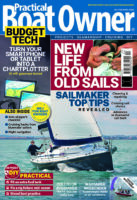Should drink-boating be illegal – you vote
Should drink-boating be illegal you vote
The US Coastguard is cracking down on drink-boating, a problem which they believe to be widespread (see PBO 460). In 2003 almost a third of US leisure-boat fatalities involved alcohol despite drink-boating being illegal and incurring huge fines or even imprisonment.
To see just how prevalent drink-boating is the coastguard has commissioned a national study of boating under the influence.
In the UK its currently only against the law for professional mariners to be over the limit. However, the Government have decided to extend alcohol limits to recreational boats they just need to decide how to implement it
The facts
The limit of 80mg of alcohol per 100ml of blood will apply to recreational boaters. This is the same limit as on the roads
The limits only apply to the skipper while underway
Some harbour bylaws already have anti-drink-boating laws
Police will use the same testing equipment as they do for road-side testing but will not be allowed to conduct random tests
The relevant provisions can be found in Part 4 of the Railways and Transport Safety Act 2003
Aims of the consultation
The Government is minded to target large recreational vessels, high-powered motorboats and personal watercraft while excepting rowing boats, dinghies, narrowboats, sailing boats with auxiliary motors, and tenders. There are three parameters:
Power of a motor this could be either the nominal power or maximum speed through the water (insurance companies use 17 knots as a cut-off)
Size of a vessel this could be measured by length (eg under 22m), people-carrying capacity or displacement
Location alcohol restrictions could also apply to canals, rivers and lakes
Combinations of the three parameters are likely to be necessary. For example, to regulate a boat according to its size may exempt jet-skis, which is not the Governments intention
The consultation also wishes to determine whether marine officials should be given the power to detain vessels pending the arrival of the police. (These powers are already available to harbour masters and MCA officers)
Against legislation the RYA
Harbour bylaws already provide adequate controls to deal with drink-boaters
The Government has not provided any persuasive evidence that alcohol is a problem
Like most activities there are a small minority who behave irresponsibly and legislation will not stop them
The law is not enforceable
For legislation from the US Coastguard website: www.uscgboating.org/safety/bui
Alcohol affects judgement, vision, balance and co-ordination. US Coastguard data shows that in boating deaths involving alcohol use, over half the victims capsized their boats and/or fell overboard
Alcohol is even more hazardous on the water than on land. The marine environment motion, vibration, engine noise, sun, wind and spray accelerates a drinkers impairment. These stressors cause fatigue that makes a boat operators co-ordination, judgement and reaction time decline even faster when using alcohol
Alcohol can also be more dangerous to boaters because boat operators are often less experienced and less confident on the water than on the highway. Recreational boaters dont have the benefit of experiencing daily boat operation. In fact, boaters average only 110 hours on the water per year.
Links
http://www.dft.gov.uk/stellent/groups/dft_shipping/documents/page/dft_shipping_028069.hcsp
http://www.dft.gov.uk/pns/displaypn.cgi?pn_id=2004_0034
http://www.rya.org.uk/legal/default.asp?contentID=3189623
http://www.uscgboating.org/safety/bui.htm



